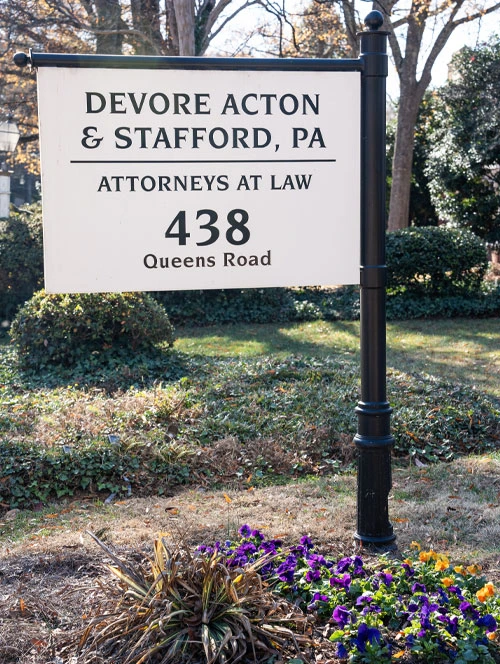North Carolina Personal Injury Statute of Limitations

When you’re considering filing a personal injury claim, it’s important to be aware of the timeline that starts right away. Begin the legal process by familiarizing yourself with the North Carolina personal injury statute of limitations. An experienced personal injury law professional can help you understand which statutes may apply to your case.
Filing an Injury Claim to Recover Damages
North Carolina personal injury laws allow victims of another person’s negligent actions to seek compensation for the damages caused to them. This may be achieved by filing a claim with the liable party’s insurance company or by opening a case against them in civil court. For the most successful outcome, it’s recommended that you work with a qualified personal injury lawyer who can represent you in legal meetings and help you understand what you are eligible to recover.
How much you may be entitled to in compensation depends on the details of your situation. Determining factors include the type of personal injury accident, the extent and severity of your injuries, and whether you were left partially or fully disabled. The compensatory settlement awarded in a personal injury case includes both non-economic and economic damages.
Economic damages can include past and future medical expenses, property damage, lost income, and loss of future wage capacity. Non-economic damages can be difficult to quantify since they represent the victim’s personal experience. These damages cover the individual’s physical pain, emotional suffering, loss of enjoyment of life, and permanent scarring or disfigurement.
Different Statutes of Limitations for Injury in NC
Many legal claims have a set deadline for taking action, otherwise, you run the risk of your case being dismissed automatically. This is known as the statute of limitations, and personal injury cases also abide by these legal timelines. In the state of North Carolina, there are multiple statutes of limitations that may apply to your case depending on the type of injury claim you are looking to file.
Generally, personal injury claims have a statute of limitations spanning three years. This usually applies to injuries resulting from motor vehicle collisions, dog bites, dangerous or defective products, and hazardous or poorly maintained property.
There are some exceptions to this statute, including the following:
- Wrongful Death: When a personal injury accident results in the victim’s death, the individual’s family or estate has two years from the date of their passing to file for wrongful death.
- Workers’ Comp: When filing for workers’ compensation, you have two years from the date of injury or when the injury became apparent to you.
- Medical Malpractice: These cases can have varying statutes depending on when you discovered the negative impacts of the malpractice. Despite any variance from the usual three-year rule, there is a four-year statute of repose that applies. This means you lose your right to file for injury after four years have passed from the time you received the negligent care.
If you’re unsure whether your case may apply to one of these exceptions, be sure to consult with a qualified personal injury law professional to understand all of your legal options. Additionally, there are instances where the starting point of your personal injury claim may vary.
For example, many cases have a definite date of injury, such as after a car crash or slip and fall incident. However, when injuries develop over time, such as from medical malpractice or a harsh work environment, the clock generally starts on the date of discovery or when the injury should have reasonably become apparent to you.
FAQs
Q: What Is the Statute of Limitations for Personal Injury in NC?
A: In North Carolina, personal injury claims have a legal timeline for the party seeking compensation to file within for the case to be considered valid. This is known as the statute of limitations. For most types of personal injury, this deadline is three years from the date of the injurious accident. There are some exceptions to this rule. To learn more about which statutes of limitations may apply to your situation, be sure to speak with a qualified lawyer.
Q: Is There a Legal Deadline for Medical Malpractice in NC?
A: Yes, there is a legal deadline for medical malpractice claims in North Carolina. The statute of limitations for malpractice cases is usually three years from the date you received the negligent medical care.
However, the timeline may not start until you discover the negative effects of the malpractice, depending on your case. State injury laws assert that regardless of the date of discovery, a malpractice claim cannot be filed after four years have passed since the date of treatment.
Q: When Does the Clock Start for Personal Injury in North Carolina?
A: When the clock may start for your personal injury claim can vary depending on several factors. Generally, the statute of limitations begins on the date of the accident that caused your injuries. However, it’s not always apparent right away that you sustained an injury after an accident. In these cases, the clock starts on the date of discovering the injury. This is why it’s important to seek medical attention following an injury so you have documented evidence.
Q: Why Should I Take Action Early After a Personal Injury in NC?
A: It’s incredibly important that you take legal action as early as possible following a personal injury accident. The reason for this is that the more time your legal team has to build a strong case on your behalf, the better your chances are of obtaining a successful outcome. Even if you’re not sure whether your circumstances may qualify for compensation, consult with an injury lawyer sooner rather than later.
Seek Professional Legal Counsel for Your Injury
You can trust the team of personal injury professionals at DAS Law Group, P.A., with your case. We take care to ensure each of our clients receives the kind of attention and hard work their case deserves. Contact us today to schedule a consultation with a skilled injury lawyer.

request your consultation
"*" indicates required fields


